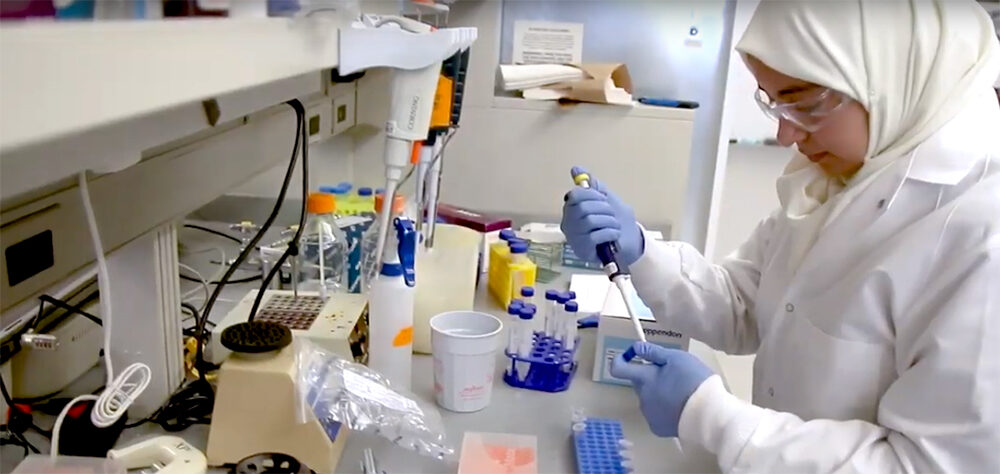Two years in the life
Scientist Majd Abdulghani first caught the world’s attention as a 19-year-old podcaster living in Riyadh, Saudi Arabia. She recorded more than 100 hours of her life during a two-year period, interviewing her brothers, other family members, and friends. “Majd’s Diary: Two Years in the Life of a Saudi Girl by Radio Diaries” aired on National Public Radio and won several national awards.
Today, Abdulghani works as a geneticist and researcher in U-M’s Life Sciences Institute (LSI). This fall, she will join University of Oxford as Saudi Arabia’s first Rhodes Scholar. Her nontraditional career trajectory from teen podcaster to esteemed scientist just goes to show that you never know who’s listening.
“The vulnerability in the podcast, that is what makes us human and connects us,” Abdulghani says. “That’s what made people from different places across the world, from starkly different backgrounds from mine, reach out to me.”
One of those people was the LSI’s Vivian Cheung, a research professor and Howard Hughes investigator. Abdulghani’s passion for science came through loud and clear, and Cheung was compelled to help the aspiring researcher achieve her greater goals.
“She’s absolutely terrific,” says Cheung. “Majd’s podcast showed clearly that she is smart and dedicated to becoming a scientist. She will encounter barriers and challenges and it is our responsibility to equip and encourage her.”
Tuned in
At Oxford, Abdulghani will join 100 other Rhodes scholars chosen from points across the globe for their academic excellence, mastery in extracurricular areas, moral character, and leadership ability. The scholarship only became available to students from Saudi Arabia in 2018 and is funded by Muhammad Alagil, chairman of Jarir Group.
Sitting in a coffee shop in Ann Arbor on a gray winter morning, Abdulghani “still can’t believe it sometimes. I am excited for the opportunities that will come up in the journey.”
The LSI’s Cheung had stayed in touch with Abdulghani even after she ended the podcast, got married, and moved to Ames, Iowa. There, Abdulghani and her husband pursued graduate studies at Iowa State University. In 2016 Abdulghani enrolled in the university’s master’s program in genetics, development, and cell biology.
“I was so far away from home, so far away from family. Having my husband there with me, who was going through the same graduate school experience helped me tremendously,” she says.
Upon graduation, Abdulghani accepted Cheung’s offer to come work in her lab at the LSI. So, while her husband now completes his doctorate work in electrical and computer engineering at Iowa State, Abdulghani is researching the ways in which RNA sequence and structure transcribe information to protein at U-M.
“Right now, I am living my science dream,” she says.
Express yourself
Working in the Vivian Cheung Lab has illuminated a number of pathways for Abdulghani to explore. From working on placenta, she now is focusing on how RNA helps genes express themselves.
“Our genes are coded in DNA, but for them to express themselves, they have to be converted to RNA, which is then translated to protein,” Abdulghani explains.
The research can help in preecamplysia, a pregnancy complication characterized by high blood pressure and signs of damage to another organ system, most often the liver and kidneys. The condition can restrict growth in children.
The right stuff
Abdulghani, who was chosen from 900 applicants for the Rhodes scholarship, says she gets her tenacity from her mother, a computer scientist in Saudi Arabia.
“It took my mom eight years to finish her bachelor’s degree because she had little kids. But she never gave up,” Abdulghani says. “She went on to get her master’s and her doctorate. She completed her PhD raising three teenagers and two kids.”
Abdulghani wants to follow in her footsteps and go back to Saudi Arabia after she completes her doctorate work at Oxford.
“I want to start a research lab and help mentor women just like the help I have received here,” she says. “Saudi Arabia is changing fast. Still, there are not enough women doing research. I think it’s around 30 percent and we really need to fix it.”
Cheung concurs. “There are not enough women and other minorities in leadership positions in science,” she says. “It is important to remind everyone that one person can make a difference. One at a time, lives can be changed. Majd will lead the way to imagine what is possible.”




Anne Gautreau - 1976
Thank you for the four great insights on how women can move ahead into STEM careers:
1. “Her nontraditional career trajectory…goes to show that you never know who’s listening.”
2. “…she gets her tenacity from her mother….”
3. A brilliant couple can feel secure enough to pursue studies at different universities.
4. “…one person can make a difference. One at a time, lives can be changed.”
Reply